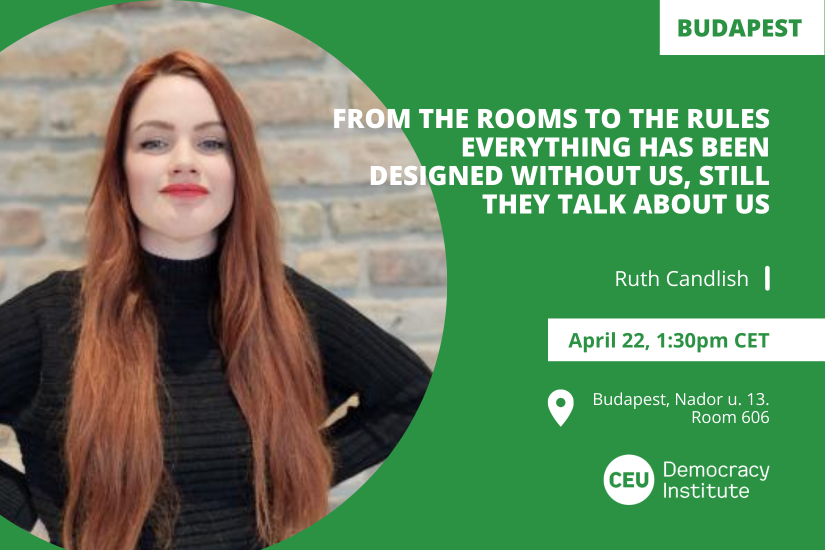
The Inequalities and Democracy Workgroup of the CEU Democracy Institute cordially invites you to its public seminar. You can check our past events here.
If you would like to attend, please register here.
Please keep in mind that external guests will not be able to enter the building without prior registration.
The seminar starts with a 25-minute paper presentation followed by comments from the discussant. Discussion open to the audience follows. To actively take part in the discussion, please read the draft paper beforehand. The paper is available upon request from the authors.
Abstract:
Parliaments are filled with rules, rituals, relics and rooms. These different institutions act as vessels conveying the ideas, norms, and values that dominate politics. Everything from art to voting procedures is a reminder about power, dominance, and politics. These institutions are never neutral – they have been (re)designed to uphold, and sometimes upend, pre-existing power hierarchies. This paper explores how parliamentary institutions shape the political representation of disabled people – how disabling and disempowering power hierarchies are reflected, reinforced, and sometimes reformed in political arenas. Building on the dis/ability complex, as developed by Dan Goodley (2014, 2018), it draws upon the concepts of disablism, discrimination against disabled people, and ableism, discrimination in favour of non-disabled people, to differentiate between distinct institutional practices of in/exclusion. As one of few cross-national comparisons into how parliamentary institutions relate to disabled people, it builds on empirical experience and borrows literature from diverse fields from education to critical architecture. Capturing a range of different institutional factors from electoral systems to specialised parliamentary bodies to weekly schedules, it attempts to build an institutional snapshot of the different ideas, norms and rules shaping the political representation of disabled people, and how it varies, and how this might impact on political representation.
Speaker:
Ruth Candlish is an international award-winning policy scholar and activist. As a doctoral candidate in the School of Public Policy at Central European University (CEU), she works on disability, political representation and participation, equality policy, intersectionality, and employment. Her dissertation examines the political representation of underrepresented and marginalised groups in parliaments, in particular disabled people. She is a Research Affiliate at the Democracy Institute, as part of the Inequalities and Democracy research group, Ruth is also a member of ECPR Standing Group on Parliaments, the Political Studies Association 'Parliamentary Studies is for Everybody' working paper group, the Motherscholar Collective Research community. She has worked as a Researcher for the SUPERA project (Supporting the Promotion of Supporting the Promotion of Equality in Research and Academia European initiative), working on initiatives related to gender equality, pregnancy, maternal and parental support, and sexual harassment. She has published research, op-eds and blogs on inequality, policy, academia, and accessibility.
Discussant:
Gábor Petri is a postdoctoral researcher at the CEU Democracy Institute. He received his PhD at the University of Kent, Tizard Centre in 2019, where his research explored the position of self-advocates in the learning disability and autism advocacy movement. Gabor has over 20 years of experience in the disability field. He has held various positions at disability rights organisations both in Hungary and in the EU. He was director of the Hungarian Autistic Society (2006-2010), where he led the work on the first Hungarian National Autism Strategy. Gabor worked as human rights officer at Mental Health Europe (2011-2014). He was member of the Board of Directors of the European Disability Forum from 2013 to 2022, representing Mental Health Europe. Gabor’s research interests include post-socialist disability policies, the disabled people’s movement, disability human rights, mental health policies, the use of EU Structural Funds, and community-based services.
Chair:
Andrea Krizsan is Senior Research Fellow at the Democracy Institute and Professor at the Department of Public Policy and the Gender Studies Department. She works on the politics of inequalities and equality policy interventions in countries of Central and Eastern Europe. Her current research focuses on gender equality aspects of de-democratization processes and the role of civil society in building democratic resilience and inclusive democratization processes. Besides her academic work Andrea also acts as the Chair of the CEU Senate Equal Opportunity Committee. Andrea has a PhD in Political Science from the Central European University.